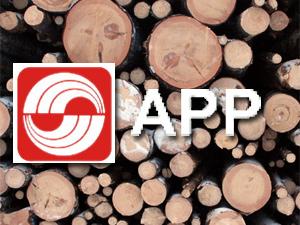
UPDATE: On October 11, 2012, Disney announced a comprehensive paper policy that maximizes its use of environmentally superior papers like recycled and eliminates controversial sources like those connected to Indonesian rainforest destruction. For more info, visit www.ran.org/disney.
As Rainforest Action Network (RAN) continues our negotiations with The Walt Disney Company to secure a comprehensive paper policy that would exclude rainforest destruction from the company’s products, we are also keeping our eyes on the real prize: reforming logging giant and Indonesian rainforest destroyer Asia Pulp and Paper (APP).
APP has been called “one of the most destructive companies on the planet” by UK Guardian reporter George Monbiot, and now the shadowy logging behemoth is busy pursuing aggressive expansion plans into North American markets, including buying up a slew of paper mills in Canada. While RAN has been tracking the company’s trail of destruction for years, the first time many Americans heard of APP was in a front page New York Times piece last March.
RAN and our allies have been working hard to make sure it would not be the last time Americans hear about APP and its destructive ways. Over the past years, a steady stream of major corporate customers have dropped their contracts with APP, including major US book publishers Scholastic, Hachette, and Simon & Schuster; leading toy companies Mattel, Hasbro, and Lego; and fashion giants Gucci and Tiffany and Co. As the APP brand becomes ever more closely associated with the rainforest destruction and human rights abuses the company causes, more and more corporate customers are realizing the danger of doing business with such a toxic supplier.
As public awareness rises about the massive scale and reckless pace of logging by APP and its subsidiaries, the company has been forced to respond. But, instead of acknowledging and addressing the social conflict and deforestation it is responsible for, APP has chosen to invest heavily in public relations firms to polish its image and distract consumers from the growing controversy.
The result is a sophisticated, Orwellian, internationally orchestrated effort of smoke and mirrors that refines the old art of corporate greenwashing to masterpiece levels. When the World Wildlife Fund called APP’s logging one of the leading threats to the survival of the Sumatran Tiger, APP’s brazen response was to run ads in the NYT claiming “APP Cares” and is working hard to protect tiger habitat.
There is simply too much shocking hypocrisy and doublespeak in APP’s recent playbook to cover adequately here, so interested readers will need to stay tuned for more to come from RAN on this matter — but if you have the stomach for it, this TV ad from last summer is particularly nauseating.
APP’s approach to infiltrating North American markets has been to become adept at operating under the guise of a wide array of innocuous-seeming front companies that shroud the company’s products from its contaminated brand name. These shell companies, with names like Eagle Ridge Paper, Global Paper Solutions Inc., Solaris Paper, and Mercury Paper, are expanding throughout the US and Canada, and many customers have no idea they are actually buying from APP.
RAN looks forward to the day when accountability and socially and environmentally responsible sourcing replace today’s subterfuge and false claims of sustainability. We will be counting on you to help us get there.